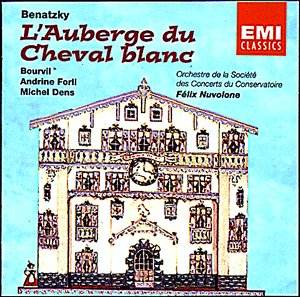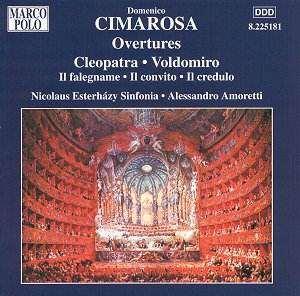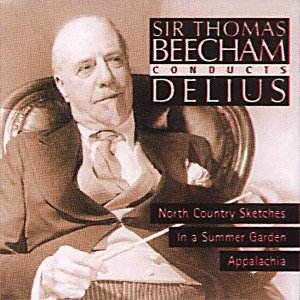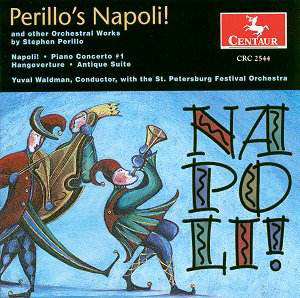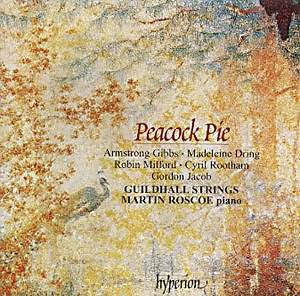 Composer: Various
Composer: Various
Works: Gordon JACOB – Concertino for Piano and Strings (1954); Cecil Armstrong GIBBS – Concertino Op.103 (1942); de la Mare – Peacock Pie (1933); Cyril ROOTHAM – Miniature Suite (1921); Robin MILFORD – Concertino in E major (1955); Madeleine DRING – Festival Scherzo (1951)
Performers: Martin Roscoe (piano), Guildhall Strings, Robert Salter (director)
Recording: Henry Wood Hall, London, July 2001
Label: HYPERION CDA 67316
The present recording, featuring a selection of works from 20th-century British composers, shines a light on a repertoire often overshadowed by more prominent figures in the canon. Each work exemplifies the distinctive voice of its composer, with Gordon Jacob’s Concertino for Piano and Strings emerging as a notable highlight. This piece, composed in 1954, encapsulates Jacob’s hallmark of melodic richness and rhythmic vitality, encapsulating a spirit that is at once both reflective and effervescent.
Martin Roscoe’s interpretation of Jacob’s Concertino is imbued with a keen sense of dialogue between the piano and strings, allowing the intricate textures to unfold organically. The piano flourishes with an expansive lyricism, especially in the second movement, where Roscoe’s touch is both delicate and assertive, deftly navigating the work’s shifting moods. The orchestration reveals Jacob’s mastery in color, with the strings providing a lush backdrop that complements the piano’s exuberance. The recording captures the clarity of the ensemble’s interplay, with the engineering ensuring that each strand of sound is crisply defined, allowing listeners to appreciate Jacob’s intricate counterpoint.
The inclusion of Cecil Armstrong Gibbs’ Concertino Op.103 adds a contrasting emotional depth to the program. Composed during the wartime years of 1942, this work reflects a more somber and introspective character. Here, Roscoe’s interpretation leans toward the lyrical, particularly in the slow movement, where the piano’s expansive lines evoke a sense of longing. The Guildhall Strings, under Robert Salter’s direction, respond with a warmth that enhances the work’s melancholic beauty. The engineering balances the piano and strings effectively, creating an intimate yet resonant soundscape.
The three-movement suite, Peacock Pie, based on Walter de la Mare’s verses, brings a playful charm to the collection. The movements are imbued with an effervescent whimsy, and the performers navigate the shifts in character with evident glee. The lilting melodies and rhythmic playfulness are delivered with crisp articulation, evoking a sense of youthful exuberance. The precise engineering allows the fleeting motifs to dance in the air, a testament to Hyperion’s commitment to high-quality sound production.
Cyril Rootham’s Miniature Suite further enriches this collection with its folk-like themes and expressive slow movement, which reveals Rootham’s ability to blend simplicity with sophistication. The performance here captures the work’s pastoral essence, with the ensemble’s nuanced dynamics bringing out the subtle contours of the melodies. It is notable that this recording marks a welcome return for this piece, previously overshadowed by more mainstream repertoire.
Robin Milford’s nostalgic Concertino in E major and Madeleine Dring’s lively Festival Scherzo round out the program, showcasing a range of emotional and stylistic contrasts. Milford’s work is particularly striking for its lyrical beauty, reminiscent of Finzi’s pastoral qualities, while Dring’s Scherzo, with its playful rhythms and spirited character, provides a jubilant conclusion to the disc. Roscoe’s approach to both pieces is marked by an infectious enthusiasm that is palpable throughout the performance.
The sound quality of this recording is exemplary, capturing the nuances of the instrumental colors while maintaining a cohesive ensemble sound. Hyperion has once again succeeded in creating an engaging listening experience that highlights the often-underappreciated works of these British composers.
This collection is a testament to the vibrant tapestry of British classical music in the 20th century, inviting listeners to explore a repertoire that is rich in melody and character. With its blend of historical significance and delightful artistry, this recording deserves a prominent place in any discerning listener’s collection.
